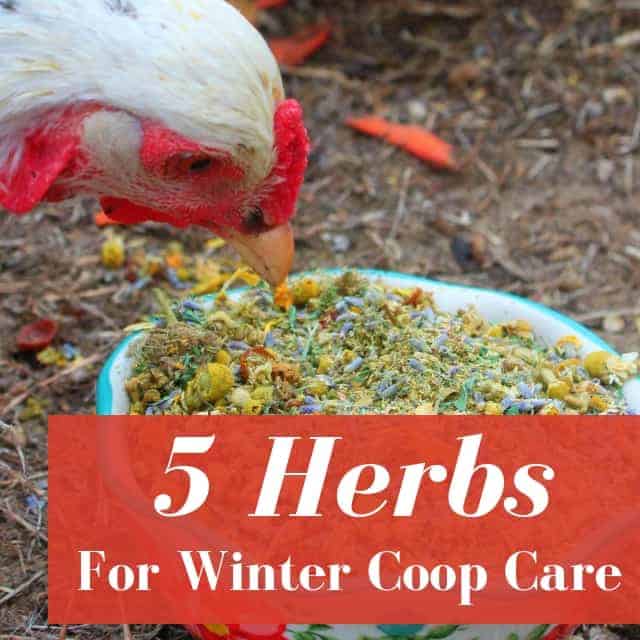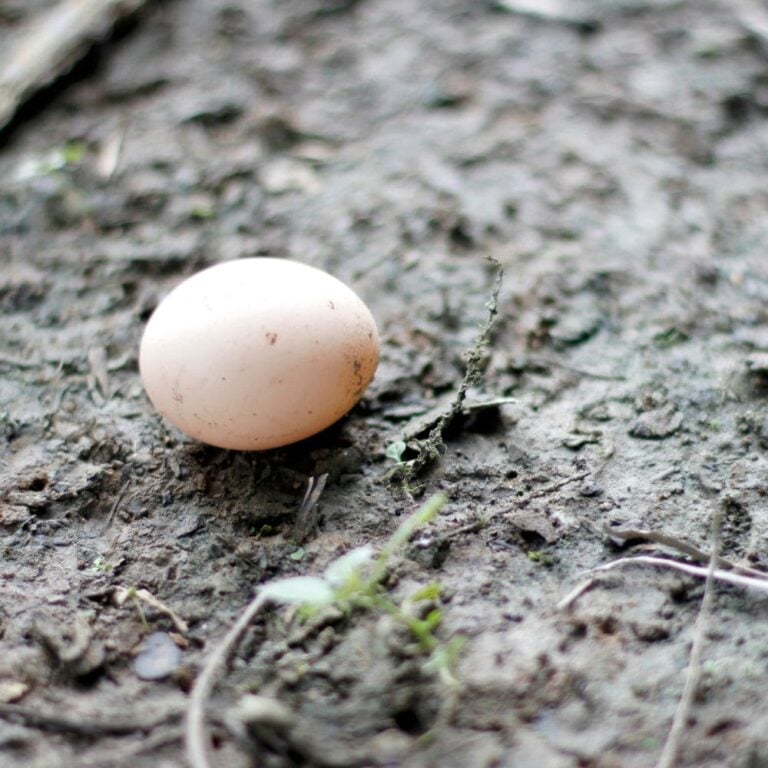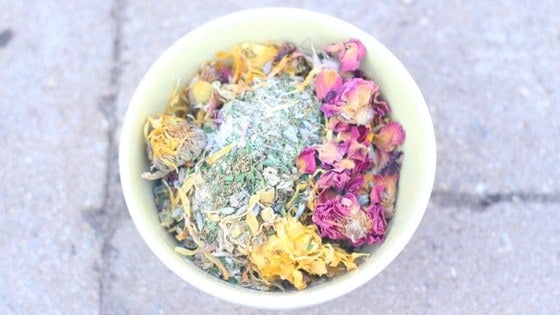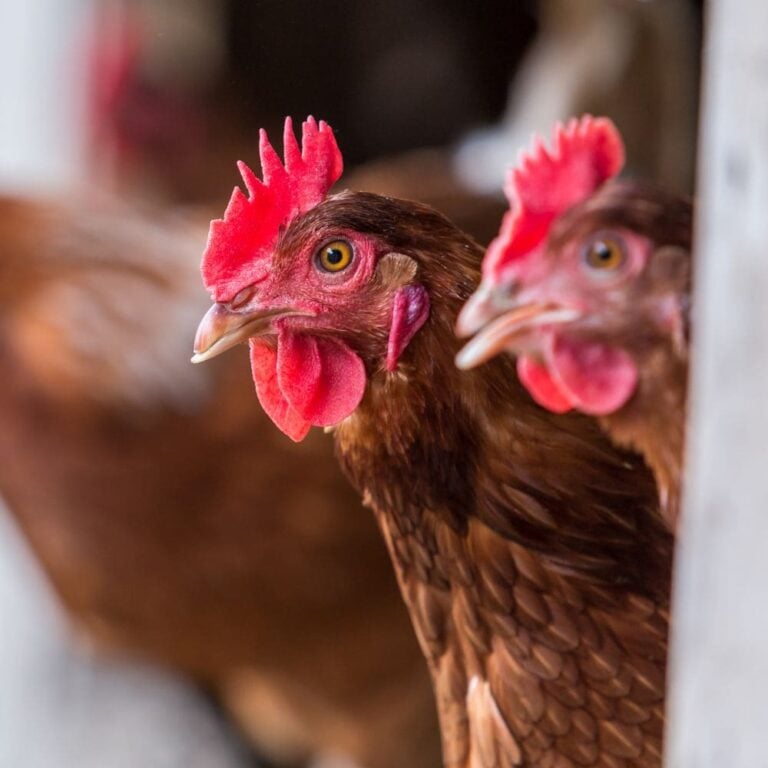Do you want to add nesting herbs to your flock’s daily routine? Not sure which ones are best for your hens? Unsure about what your flock really needs?
In this article, you’ll discover the best way to figure out which nesting herb blend is best for your hens!
We’ll also cover how different herbs can provide various kinds of support, and why it’s so important to choose the right nesting herb blend.
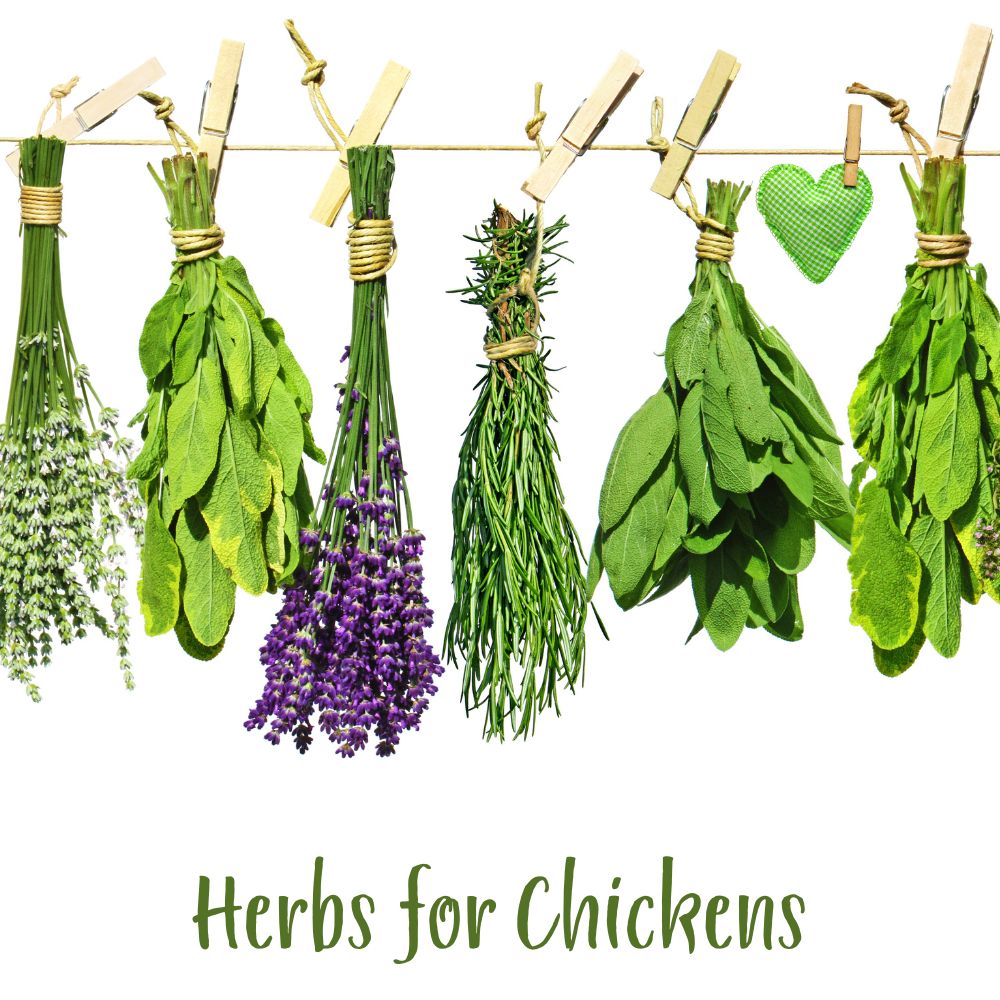
What’s The Point Of Nesting Herbs?
You’re looking at all these herbs for chickens on Amazon, and they’re all starting to look the same. You’re not even sure what you need! Herbs can provide a lot of all-natural support and help you establish a healthy flock. They can also create a home for your hens that’s inviting and promotes egg laying, without using any synthetic or chemical scents.
There are a few different ways to use herbs:
- As a feed additive
- In your flock’s water
- Mix with bedding
- Add to nesting boxes
For example, you can mix herbs with your flock’s feed to improve digestion, improve the flavor of their feed, support immune systems, and/or add environmental interest. If you mix herbs into your flock’s nesting box or bedding, you can provide respiratory support, make the coop less attractive to flying insects, repel mites, and/or improve air quality. You can even use herbs topically by mixing them into dust baths or by sprinkling them directly on your flock.
Why Most Flock Owners Use Nesting Herbs
If you’re new to chickens, or just looking to up your game, you might wonder why other flock owners use herbs in their coops, nesting boxes, and feed. There’s got to be some advantage if everyone’s doing it, right? After asking my readers, everyone I talk to has one or more reasons:
- #1 A great smelling & inviting coop
- #2 Healthier & better-smelling nesting boxes
- #3 Support egg production
- #4 Pest control
- #5 Respiratory support
Interestingly enough, these are also some of the biggest concerns that plague owners. Who doesn’t want a clean, great-smelling home for their pets? Why wouldn’t you want great eggs with strong, unbroken shells? Who doesn’t want their hens to lay in nesting boxes?
My personal goal is to raise a healthy flock using as many natural herbal remedies as possible. In my experience, herbs are some of the least expensive and most effective ways out there to raise a naturally healthy coop (especially compared to replacing flock members or visits to the vet).
In our own coop, we started adding herbs to nesting boxes a few years ago. The hens seem happier and enjoy the herbs as treats. I like that the hens lay their eggs right in the nesting boxes (as opposed to the ground, where they can easily get broken and eaten). During days when they can’t go outside, the herbs keep them entertained for part of the day.
Examples
For example, this year, we’ve had a LOT of rain. Since chickens hate wet weather, they stay inside. This can quickly turn happy hens into bored hens who pick on each other and/or eat their eggs out of boredom. So, we regularly add herbs to relax the hens and provide environmental interest. It keeps them entertained and engaged, rather than indulging in unhealthy and negative behaviors.
With herbs, you can sweeten the smell of nesting boxes, repel flying insects during the summer, provide a healthy breathing environment, and more. Just remember that herbs aren’t a magical panacea – you must keep your coop clean, refresh your bedding weekly, and perform other good animal husbandry practices.
We’ll dive into each of these reasons below. We’ll also cover which herbs or herb blends work for each specific reason.
Beware Of Nesting Herb Blends That Won’t Work
What’s not commonly understood is that herbs have specific traditional uses. Humans have sorted it out over centuries, and now there are even studies to support the positive use of herbs. Because people now know so much about herbs, we also are aware that an herbal combination can work against you.
For the best results with nesting herbs, it’s crucial to buy your flock’s nesting herbs from a safe source and to verify the herbs in the bottle or the bag are the real deal.
Skip the grocery store because their herbs can sit around warehouses for YEARS. You can’t really know where they came from OR if they’re 100% pure. The herbs could easily be treated with chemicals (supposedly) safe for humans, but not meant for chickens to eat.
Many times, companies will combine lesser-quality herbs or even different species of plants. One example is cinnamon. Most cinnamon sold isn’t actually cinnamon. It’s cassia bark or a completely different herb called Chinese Cinnamon. Similar, but definitely NOT cinnamon. Cassia bark and Chinese Cinnamon don’t have the same benefits for repelling pests.
So, make sure your herbs are USA sourced, all-natural, and never synthetic or treated with any chemicals. We use these nesting herbs in our coop because we want to use all USA-sourced botanicals. We want to make sure experts are consulted before a company develops a product.
Now, let’s talk about how to choose the right nesting herbs for your flock. The information below will make it very simple for you to decide on the perfect nesting herbs for your hens, and avoid blends that work against you.
What Kind Of Environment Do You Want To Create For Your Hens?
Some nesting box herbs you see on Amazon or Facebook aren’t created for a specific purpose. Usually, the herbs in these products are chosen because they’re popular and sound good. These products aren’t created by backyard chicken experts working with herbalists or veterinarians. They’re created by anonymous companies who want to capitalize on the backyard chicken craze.
These blends don’t have much use. You can tell because the manufacturers make many claims for a single product, such as “controls worms AND helps relax AND improves your flock’s immune system, AND controls mites” etc.
These claims sound good. If you read between the lines, however, you’ll discover the true meaning: “We don’t know what we’re talking about, so we’ll just say what you want to hear.”
On the other hand, some nesting herb blends are created for a specific use. You can buy a blend for:
- Pest control (such as mites)
- Intestinal worm control
- Support for egg-laying
- Creating a relaxing environment
- Adding environmental interest and joy to your coop, or
- Immune support
To make your decision easy, ask yourself: What do you want your new nesting herb blend to do?
- Do you want to support egg-laying?
- What about controlling mites and lice?
- Offer respiratory support to avoid respiratory infections?
Figuring this out will help you decide on the perfect blend for your flock. It’ll also help you determine whether those herbs will work for you OR against you. You’ll end up with more bang for your buck, and a much less frustrating experience.
To make this point clear, let’s look at some common situations we all need to troubleshoot in our own coops.
Egg Production Support
Supporting egg production is really, really important. It’s a very easy way to make sure your hens are as healthy as possible. Herbs can be helpful if your:
- Pullets just started laying
- Hens return to laying after winter or a molt
- Flock stopped laying for some unknown reason
- Flock is super healthy already, and you just want a little extra support
- Want to treat them to a fancy, sweet-smelling nesting box
When they just start laying, pullets (and even grown layers) don’t always make enough calcium to produce a strong eggshell. Why is this?
Creating eggs takes a lot of nutrients and energy out of your hens. She must draw the calcium from somewhere to craft her eggshells. It also takes a lot of nutrients! Luckily, providing support is easy. You can:
- Provide oyster shells for extra calcium
- Increase the protein in your flock’s diet
- Add herbs to their nesting boxes for extra nutrients & to create a nice-smelling nesting area
Let’s take a closer look at these options.
Oyster Shells
When your chicken eats oyster shells, it provides extra minerals to help her create healthy eggs. Readers frequently email me to ask why their hen laid a wrinkled, lopsided, or soft shell egg. It’s probably because the hen wasn’t getting enough essential minerals! Oyster shells are mainly made of calcium and a bit of a powerhouse for eggs. When your hen eats them, she can use the calcium to produce strong shells.
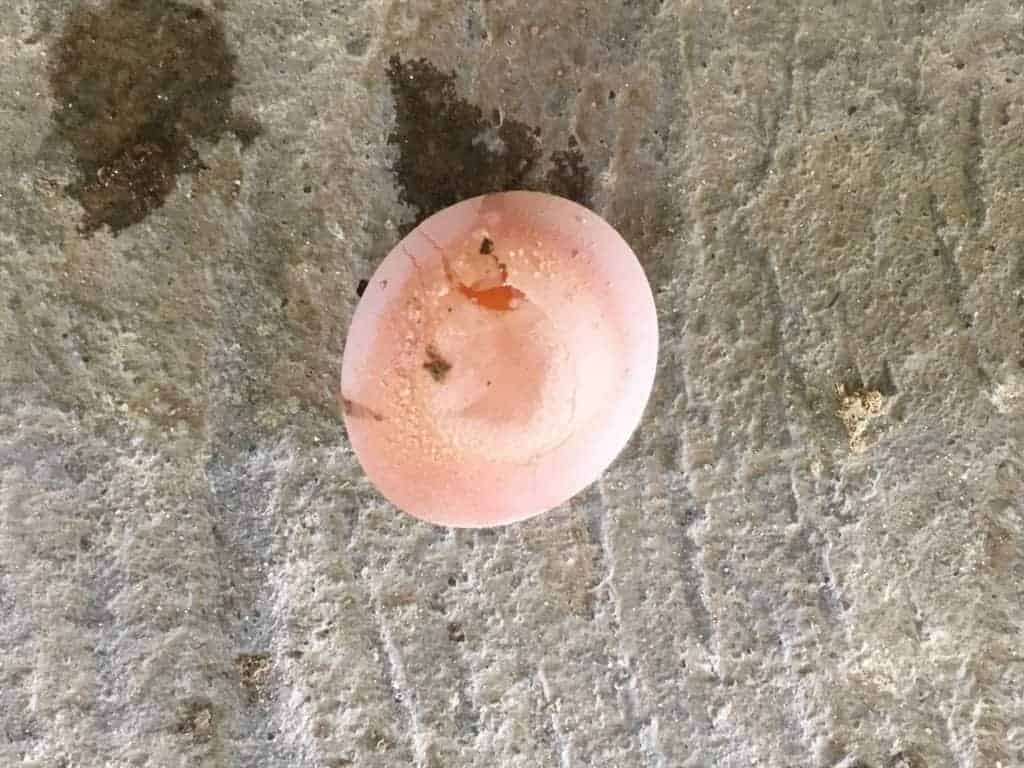
You can offer oyster shells free choice, in an herbal blend (like our blend Best Eggs Ever!), or mix with your flock’s daily feed.
Herbs To Support Egg Production
If you’re reading this article, however, you probably know about all oyster shells. And you’re probably also interested in using herbs in your coop. Luckily, you can also support your layer with herbs! Dried flowers such as:
- calendula
- rose
- lavender, and
- chamomile
can create an attractive nesting box. This is especially important if your hens aren’t using their boxes, and laying their eggs in the coop, or worse, in the dirt. (We talk more about why hens stop using nesting boxes in this article).
It’s best to mix herbs together before adding them to the nesting box. Although a single herb will have some benefits, such as a great smell, when blended together, they’ll provide even more support.
For example:
- Beta carotenes in calendula support nice, golden egg yolks.
- Calendula, lavender, and rose petals are soothing.
- Garlic, basil, and rosemary support healthy oviduct functions.
While you can use any of these herbs individually, you’ll get better results if they’re blended together to provide a symphony of support (we’ve blended them together in our product, Best Eggs Ever! to make it easy). The herbs mentioned above smell great and have been used for centuries for these specific purposes.
Relaxation and Comfort
Healthy eggs start with happy hens. If a layer is scared, stressed, or unhappy, she’ll likely stop laying eggs. For example, if a predator got into your coop, your flock might be scared. They might stop laying altogether, or simply refuse to use their boxes. They don’t feel safe!
Similarly, if your boxes are smelly, you might notice your hens prefer to lay on the ground, or worse, in a random place on your lawn. (Hello Easter egg hunt!)
They don’t feel safe in their boxes.
How We Help Hens Who Refuse To Use Nesting Boxes
Whenever one of our chickens stops laying or refuses to use her nesting box, we first thoroughly clean the nesting area, then add herbs to their boxes. The sweet smells and bright colors get their attention, and attract our hens to their nesting boxes.
Whenever this happens, you might consider adding herbs to attract your hens to their nesting boxes. Herbs that help your hen relax are a perfect choice. You’ll want an herbal blend that smells great and is irresistible to our feathered friends.
Not every herb will do! You’ll want herbs traditionally used to create a relaxing environment. Fragrant flowers like these are all great options:
- Calendula
- Chamomile (traditionally used to relax)
- Lavender (also traditionally used to relax)
- Rose petals (great scent)
Flowers or Petals?
You can use the whole flower or just the petals. Either is fine! For lavender and chamomile, I use the whole flower since they’re so small. I also use the entire calendula flower because the petals are very light, and blow away easily if they are separated. Rather, the chickens can pluck the petals off the flower.
Rose petals are a bit heavier and bulkier, so using the petals is easiest (in my opinion). While the whole flower is very pretty, it’s harder for chickens to pick at if whole. The petals also look like spots of red among the other herbs, which is visually attractive to chickens. In my experience, hens are more likely to interact with rose petals versus the whole flower.
Other herbs traditionally used for relaxing include basil, rosemary (also great for purifying surfaces and the air), and clove.
It goes without saying that it can be difficult to grow all these herbs and flowers year-round. Some aren’t friendly for every gardening zone, while others take a long time to establish so you’ll have enough. You might need acres of available land to make enough of each herb. This is where nesting herb blends come in.
We use Best Eggs Ever! whenever our hens need some extra support or seem stressed. It’s easy to just add it to the bedding in our nesting boxes. It has all the herbs mentioned above plus oregano, basil, rosemary, and more.
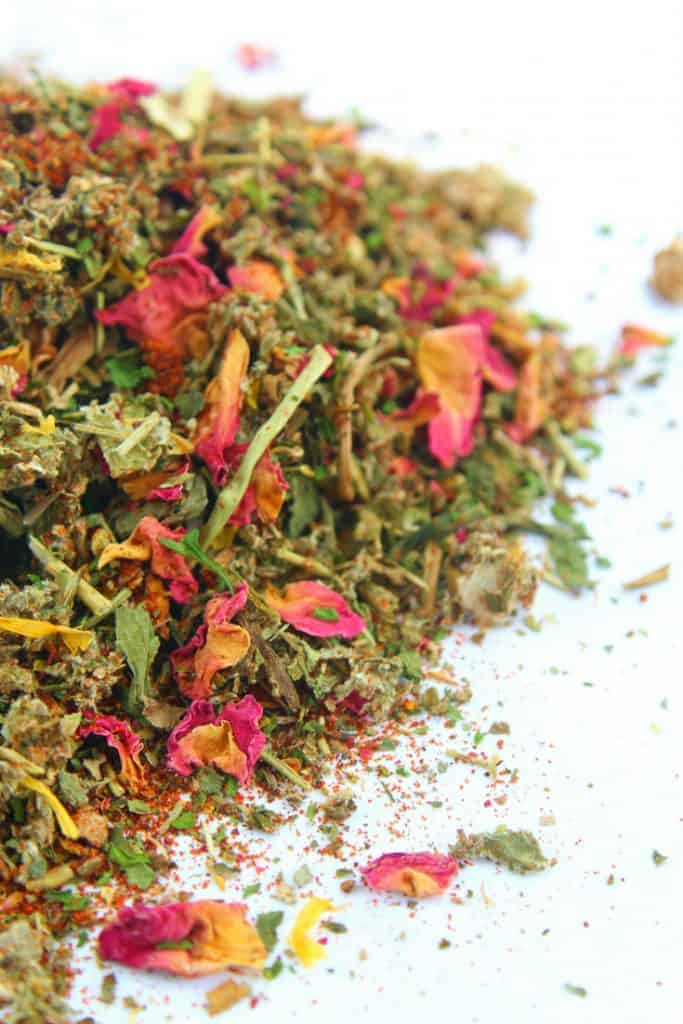
Pest Control
Will herbs for chickens prevent mites?
Let’s say mites are a problem in your coop. This is bad! Mites can make your chickens uncomfortable and unhealthy.
How do you know if your chickens have mites?
- Sometimes you see them crawling on your chickens
- There’s usually feather loss (especially around the vent)
- You see mite poop on your chickens. It looks like grey dirt caked onto the base of feathers (where feathers grow out of their skin)
- Your chicken’s skin look red, dry, and irritated
- The scales on the legs are flaking off or look very bumpy (not smooth)
If you see one or more of these symptoms, you might have mites! You should take your pet to the veterinarian:
- If you’re not sure IF they have mites OR
- If you’re not sure what to do about it
If you want to handle it yourself, you have some options to try:
- A pharmaceutical solution (it’s best to speak to your vet for specific recommendations)
- Vaseline on the legs (will be harder to implement on the rest of the body, but is good for scaly leg mites)
- Apply diatomaceous earth or put it into their dust bathing area (good for legs and rest of body)
- Use herbs (mix with feed, put in nesting areas, use topically, and/or sprinkle in dust bathing areas)
Personally, I use a mixture of diatomaceous earth and herbs. Both are easy to get and easy to apply. I use them topically, in the nesting boxes, and in the dust bath area (our blend, MitesBGone makes it really easy).
Let’s talk more about the herbs you can use.
Which herbs are good for pest control?
You want to make your hen house a healthy, fun place for your flock to hang out. You’ll need a blend that includes herbs specifically chosen to help you transform your coop.
Not all herbs are created equal, and different herbs have different uses. In this situation, calendula isn’t going to cut it. Neither will roses. Borage won’t either.
This is why it’s SO important to not spend your hard-earned dollars on a blend that’s for a variety of complaints. For example, some blends on Amazon claim they “control worms AND help relax AND improve your flock’s immune system, AND control mites” etc. I personally stay away from these nesting herbs. As I said, herbs aren’t a panacea. It’s best to choose a blend for your specific need.
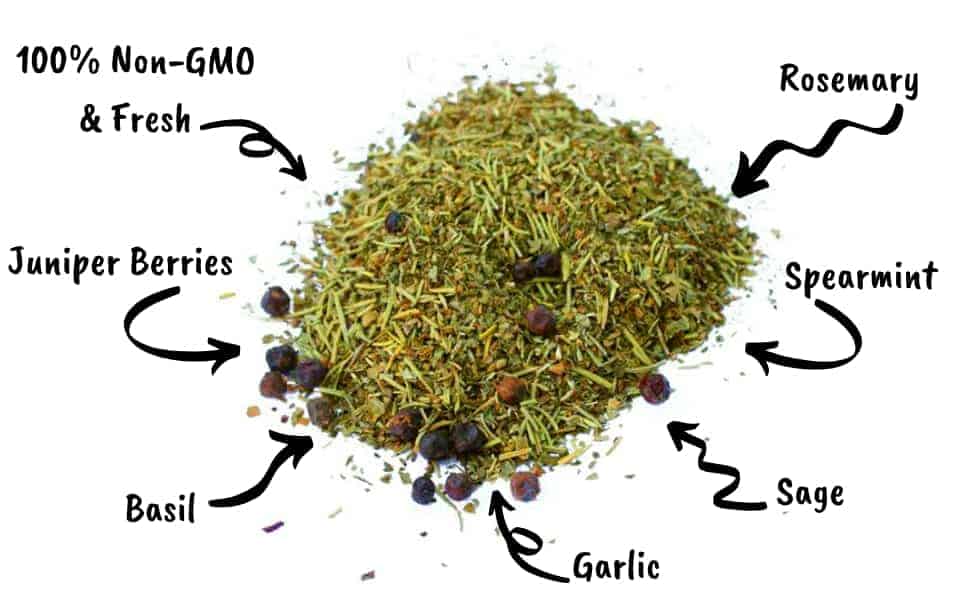
Getting back to pest control. If you want clean, healthy nesting boxes for your layers, then you should use a nesting box blend with herbs traditionally used as an insect repellent (for the body and the environment).
Example of Herbs
For example, the Environmental Protection Agency (EPA) has endorsed several herbs as safe for pest control:
- Garlic (great for flies & mites)
- Rosemary (great for mites)
- Cinnamon (great for mites, ants, & flying insects)
- Spearmint (great for mites)
- Citronella (great for mites & flying insects)
This shouldn’t be any new information. These herbs have been used for centuries to promote a clean body and environment! The EPA is just catching up to old-time, traditional knowledge. We’ve used these herbs in our coop for a long time, and they’re fantastic.
In fact, it’s how we developed one of our products, MitesBGone! Mites don’t like these herbs!
But before you rush to add herbs to your boxes, it’s important to remember that when the herbs in a blend are randomly chosen because they’re popular, you might not get the same results. In addition, if you look at the list above, no one herb works for every bothersome insect.
But blended together, you can provide a clean environment for your hens. If you want to check out MitesBGone, click here for more information.
Respiratory Support
We’ve all been there. The weather is questionable, your flock wants to stay inside, and YOU want to keep your flock in the best shape possible. We all know how important air quality is – ESPECIALLY during days when the weather isn’t super supportive.
You need a blend that includes botanicals traditionally used to support healthy breathing.
Again, not all herbs are made equal. Some herbs can actually reduce healthy respiratory functions or contain very small particles that can lead to lots of sneezing.
Experts have written volumes about the best herbs to support breathing. You should choose a nesting blend that includes ONLY these herbs. Why? Because there are also herbs that hinder healthy breathing, it’s important to find just the right herbs.
For example, I wanted to create a nesting herb blend that would support our own flock, especially during very rainy weather, winter weather, and very HOT weather (when ammonia can creep up in the coop).
I wanted to ensure my layers had only the best herbs. I consulted the experts! We desired to make sure 100% that there’s nothing in our coop that can lead to poor respiratory support. By diving deep into exploring and discovering the herbs that have been used for centuries, we found the best blends.
We strategically chose specific herbs for my flock that would help cleanse the air and support healthy breathing. Eventually, this mixture became our coop blend, BreatheRight, because they’re the herbs the experts recommend.
Examples of Herbs
For example, we discovered that we can support our flock with:
- Spearmint
- Mullein
- Turmeric
- Eucalyptus
These herbs have been used for centuries, across many different cultures, to support a well-ventilated and clean environment. If you inhale any mix with these herbs, you’ll know why! All these herbs work together – not against each other for our goal of a healthy living space.
We incorporate BreatheRight Coop Herbs into our flock’s nesting box during times when we want our chickens to have extra support. You can also mix them directly into your coop bedding. Just sprinkle ½ cup in each corner, and mix to combine.
Other Commonly Used Herbs for Chickens
- Parsley – for general health (especially blood vessel development)
- Sage – thought to help fight off salmonella
- Thyme – a natural antibiotic aid
- Lavender – a stress reliever and calming aid
- Mint and peppermint – an insect repellent
- Comfrey – provides a vitamin boost
- Marjoram – a laying stimulant
- Dill – as an antioxidant
- Yarrow – for wound care
- Fennel – can increase egg laying
Again, remember that you must take care in mixing herbs for your backyard chickens. It’s best to buy formulated herbal blends that have been tried and tested. It will ensure that you aren’t wasting your money, and keep your flock safe.
Final Thoughts
So, there you have it! Hopefully, this article makes it easier for you to figure out which nesting herbs are best for your flock. Think about what you want nesting herbs to do for your flock, and make sure those herbs (and only those herbs) are included in the blend.
It’s easy to find “any old nesting box herbs,” but it’s very important to search for a product for the specific problem you want to solve.
Maat van Uitert is a backyard chicken and sustainable living expert. She is also the author of Chickens: Naturally Raising A Sustainable Flock, which was a best seller in it’s Amazon category. Maat has been featured on NBC, CBS, AOL Finance, Community Chickens, the Huffington Post, Chickens magazine, Backyard Poultry, and Countryside Magazine. She lives on her farm in Southeast Missouri with her husband, two children, and about a million chickens and ducks. You can follow Maat on Facebook here and Instagram here.


